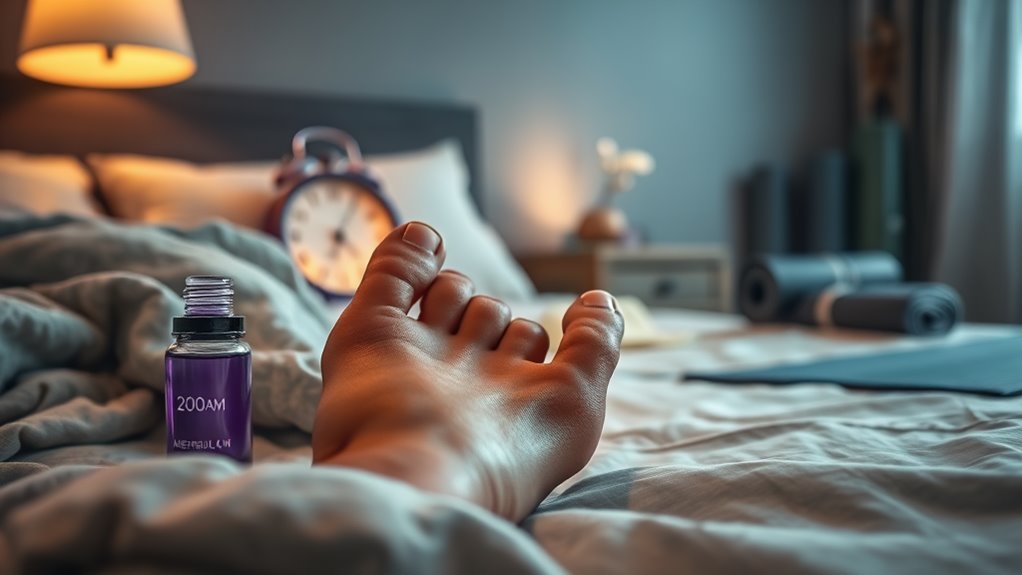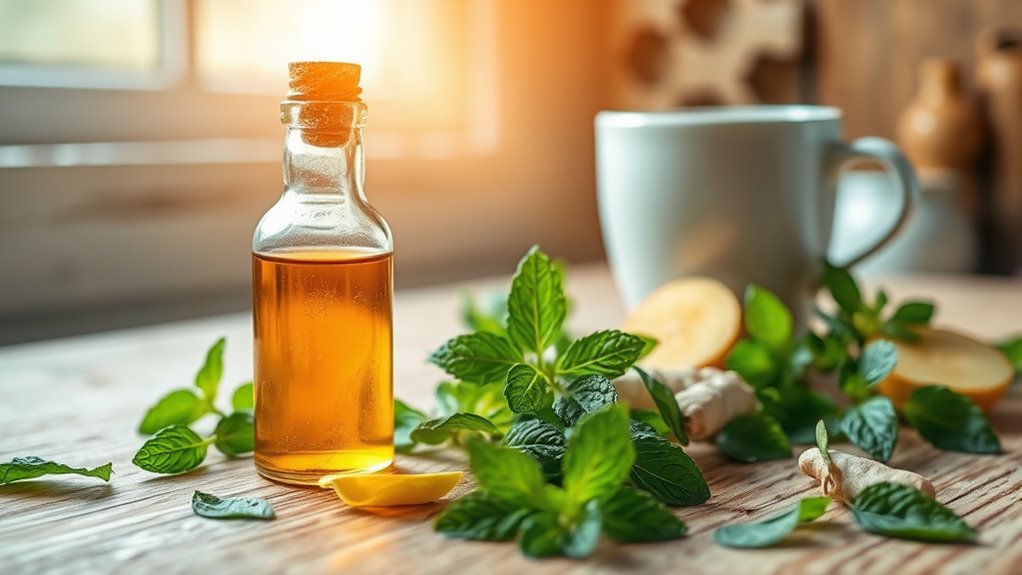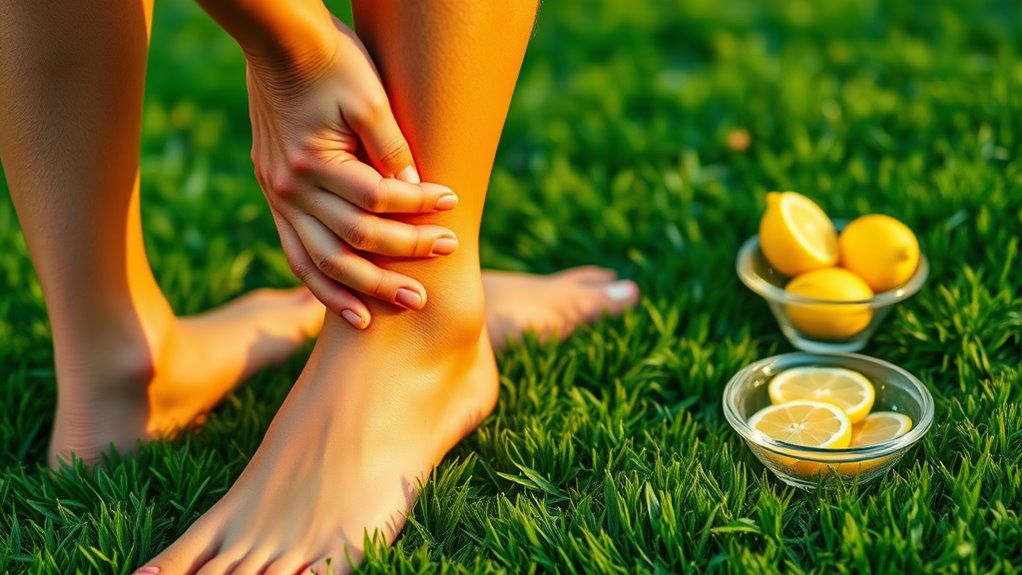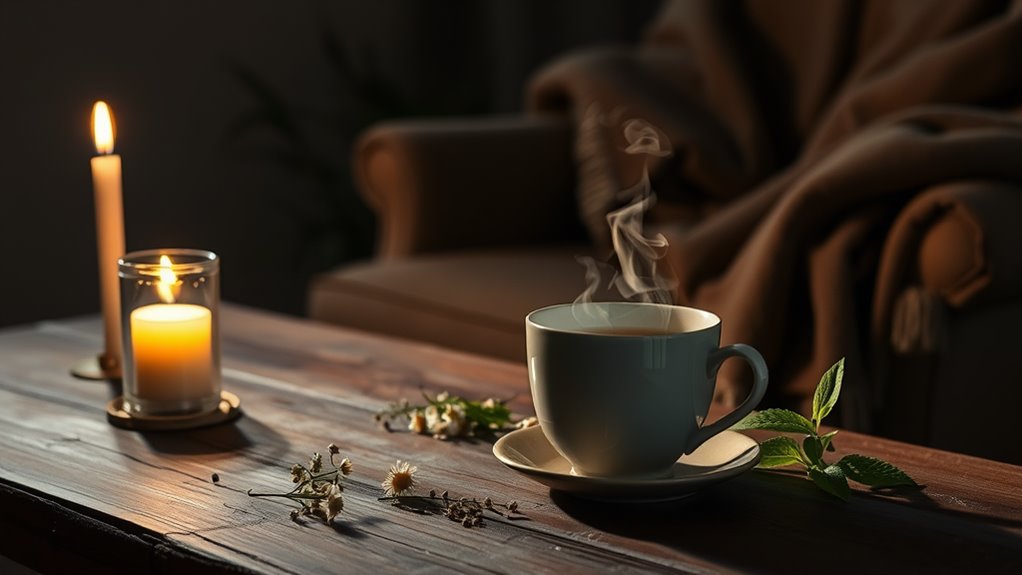Muscle Cramps While Sleeping Fix It With This!
If you’re dealing with muscle cramps while sleeping, start by stretching before bed and staying hydrated throughout the day. Ensure your diet’s rich in potassium and magnesium—think bananas and spinach. Applying heat to tight muscles can also help, as can gentle stretching during a cramp. Keeping a consistent sleep schedule and balancing your exercise routine will boost your muscle health. Discover even more effective strategies to tackle those nighttime cramps ahead!
Understanding the Causes of Muscle Cramps at Night
When you wake up in the middle of the night with a muscle cramp, it can be both startling and painful. Understanding what causes these cramps can help you prevent them.
One common reason is dehydration; your muscles need adequate fluids to function properly. Electrolyte imbalances, particularly low levels of potassium or magnesium, can also lead to cramps.
Additionally, prolonged sitting or standing during the day may cause muscle fatigue, making nighttime cramps more likely. If you’ve been exercising vigorously, your muscles might be overworked and prone to spasms.
Certain medications and medical conditions can contribute too, so it’s essential to consider your overall health. Identifying these causes can empower you to take steps toward a more restful night.
Effective Natural Remedies for Muscle Cramps
Muscle cramps at night can be frustrating, but several natural remedies can help alleviate them. One effective method is stretching before bed; gentle stretches can relax muscles and reduce cramping. Staying hydrated is also crucial, as dehydration can contribute to cramps. You might want to try magnesium-rich foods like bananas and spinach, which can help maintain muscle function. Applying heat, like a warm compress, can soothe tight muscles as well.
Here’s a quick reference table for these remedies:
| Remedy | Method | Benefits |
|---|---|---|
| Stretching | Gentle pre-bed stretches | Relaxes muscles |
| Hydration | Drink plenty of water | Prevents dehydration |
| Magnesium-rich foods | Eat bananas, spinach | Supports muscle function |
| Heat application | Use a warm compress | Soothes tight muscles |
| Essential oils | Massage with oils like lavender | Promotes relaxation |
Lifestyle Changes to Prevent Muscle Cramps
To effectively prevent muscle cramps, making a few lifestyle changes can make a significant difference.
First, ensure you stay hydrated throughout the day, as dehydration can lead to cramps.
Incorporate regular stretching into your routine, especially before bedtime, to keep your muscles flexible.
Aim for a consistent sleep schedule; going to bed and waking up at the same time helps your body regulate.
If you’re active, consider balancing your exercise routine to include both cardio and strength training, which can enhance muscle endurance.
Lastly, listen to your body; if you feel fatigue or discomfort, take breaks and allow yourself to rest.
Implementing these changes can help reduce the frequency and severity of muscle cramps while sleeping.
Dietary Adjustments to Alleviate Cramps
Although cramps can be frustrating, making dietary adjustments can significantly alleviate them. Incorporating certain nutrients into your diet can help reduce the frequency and intensity of nighttime muscle cramps.
Focus on these key elements:
-
Potassium: Bananas, sweet potatoes, and spinach are excellent sources.
-
Magnesium: Nuts, seeds, and whole grains can boost your intake.
-
Calcium: Dairy products, leafy greens, and fortified foods provide this essential mineral.
-
Hydration: Drink plenty of water throughout the day to keep your muscles hydrated.
Immediate Relief Techniques for Nighttime Cramps
When nighttime cramps strike, quick relief is essential to restore comfort and enable a good night’s sleep.
First, you can gently stretch the affected muscle. For calf cramps, try flexing your foot upwards while keeping your leg straight.
Applying heat, like a warm towel or heating pad, can also soothe the muscle. If you prefer cooling relief, gently massage the area with ice wrapped in a cloth.
Staying hydrated helps too, so take a sip of water if you can. You might also consider getting out of bed and walking around for a moment to alleviate the cramp.
Frequently Asked Questions
Can Dehydration Cause Muscle Cramps During Sleep?
Yes, dehydration can definitely cause muscle cramps during sleep. When you don’t drink enough water, your muscles can become tight and cramp up. Staying hydrated helps your muscles function properly, reducing the chance of cramps.
Are Muscle Cramps a Sign of a Serious Health Condition?
Muscle cramps can indicate various issues, but they aren’t always serious. If you’re experiencing frequent cramps, it’s wise to consult a healthcare professional to rule out underlying conditions or deficiencies that might need attention.
How Can I Prevent Cramps From Waking Me up at Night?
To prevent cramps from waking you up at night, stay hydrated, stretch before bed, and maintain a balanced diet rich in potassium and magnesium. Regular exercise can also help keep your muscles relaxed and less prone to cramping.
Is Stretching Before Bed Effective in Preventing Cramps?
Yes, stretching before bed can be effective in preventing cramps. It helps relax your muscles and improve circulation. Incorporate gentle stretches into your nightly routine, and you’re likely to experience fewer cramps while you sleep.
Do Certain Medications Increase the Risk of Nighttime Muscle Cramps?
Certain medications can indeed increase your risk of nighttime muscle cramps. Diuretics, statins, and some antidepressants are known culprits. If you’re experiencing cramps, it’s worth discussing your medications with your healthcare provider for potential adjustments.





